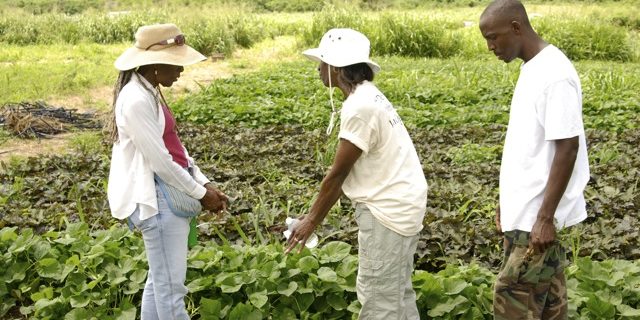The Roots of Black Agrarianism
To view this Backgrounder in Portuguese, click here; to view in French click here.
The following is an excerpt from our latest Dismantling Racism in the Food System Backgrounder, and is from 2017’s forthcoming book Land Justice: Re-imagining Land, Food, and the Commons. Click here to download this Backgrounder in full.
“Ah wakuh muh monuh kambay
yah lee luh lay kambay yah lee luh lay tambay.”
“Everyone come together let us work hard;
The grave is not yet finished; let his heart be perfectly at peace”
This song is performed by Mende women at ceremonial burials in southern Sierra Leone. One woman, who was among the cargo of African women transplanted into America in the 18th Century, ended up in Georgia and retained her memory of the song. Mary Moran’s grandmother, Amelia, taught her the song growing up in the Gullah Geechee community of Georgia’s Sea Islands. “Amelia’s Song,” spoken in the Mende native language, was preserved for more than ten generations. The documentary film The Language You Cry In tells this remarkable story. In the film, the Moran family makes a historic trip back to Sierra Leone to connect with the women there who still perform the song for burial ceremonies. When asked why Amelia’s great grandmother would preserve the song and pass it on for generations, a Mende elder replied:
That song would be the most valuable thing she could take. It could connect her to all of her ancestors and to their continued blessing. You know who a person really is by the language they cry in.1
Much like the Mende song, African agrarian roots have survived through the memory and practice of a deep enduring connectedness to the land. Today, there are Africans in America who have been rooted on family land for over 150 years. Many Black landowners are struggling to retain their land, agrarian roots, and memory of communal beliefs about land ownership and caring for nature. There are African farmers and landowners in America still surviving, like “Amelia’s Song,” but they are threatened by a hostile food and agricultural system, discriminatory government policies, and a swiftly moving tide of urban and rural development.
Click here to sign up for more information on the forthcoming book from which this Backgrounder is a part of, Land Justice: Re-imagining Land, Food, and the Commons.
Stay in the loop with Food First!
Get our independent analysis, research, and other publications you care about to your inbox for free!
Sign up today!
Click here to download this Backgrounder in full, or view the Backgrounder in full below:
DR4_final


 Help Food First to continue growing an informed, transformative, and flourishing food movement.
Help Food First to continue growing an informed, transformative, and flourishing food movement.




